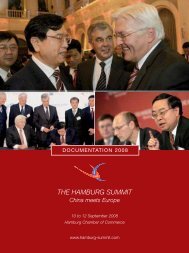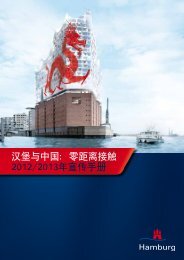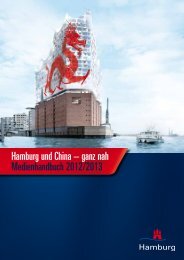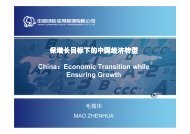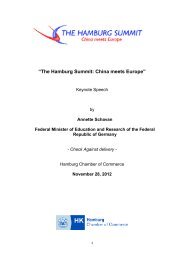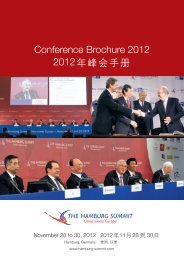Documentation Brochure - Hamburg Summit
Documentation Brochure - Hamburg Summit
Documentation Brochure - Hamburg Summit
- No tags were found...
You also want an ePaper? Increase the reach of your titles
YUMPU automatically turns print PDFs into web optimized ePapers that Google loves.
EU-China Trade Relations<br />
Lutz Bethge, Montblanc International Laurence Barron, Airbus China Cai Weici, China Machinery Industry Federation<br />
Diethard Gagelmann, Otto Group<br />
The development of trade is an accurate<br />
reflection of economic development<br />
in China. The growth rates are<br />
immense, opportunities are enormous,<br />
especially for European companies, and<br />
not just in basic industries such as<br />
energy, automotive or chemicals, but<br />
also in luxury goods. “A few years ago<br />
no-one could imagine the Chinese as<br />
customers for luxury goods on a large<br />
scale,” said Lutz Bethge, Managing<br />
Director of Montblanc International in<br />
<strong>Hamburg</strong>, but “in the next decade China<br />
will be the No. 2 market in luxury<br />
products, exceeding the United States.”<br />
Considerable problems exist, of<br />
course, inevitably so. They mainly relate<br />
to products such as textiles, clothing<br />
or shoes. There is a vague “feeling<br />
of Chinese invasion” in these markets<br />
in Europe. The EU criticises exports of<br />
pirated products and with it the lack of<br />
protection for intellectual property<br />
rights in China. But Diethard Gagelmann,<br />
Member of the Executive Board<br />
of Otto Group, the world’s largest mail<br />
order company said: “We are very<br />
satisfied”. “China can compete with<br />
other countries even better because of<br />
good products.”<br />
So a good work of information<br />
remains to be done in order to clarify<br />
that European firms also have opportunities<br />
in China. How big they are is<br />
something that Cai Weici, Vice President<br />
of the China Machinery Industry<br />
Federation, can underscore with ease in<br />
relation to his own industry. It is, he<br />
said, China’s largest and, most unusually<br />
for China, it is an industry with an<br />
import surplus. But he set clear priorities.<br />
“We need efficiency to protect the<br />
environment and we need to improve<br />
quality.” That was why the best opportunities<br />
for foreign providers were in<br />
the high-tech and high-value sectors.<br />
A company that clearly fulfils these<br />
requirements is the European aircraft<br />
manufacturer Airbus. “20 % of our entire<br />
production goes to China,” said<br />
Laurence Barron, President of Airbus<br />
China. At the same time, “half of the<br />
Airbus planes flying in the world have<br />
parts from China.”<br />
The question for all European partners<br />
in trade with China is, however,<br />
whether they can make a profit or trade<br />
is based on the “you pay all, we get all”<br />
motto that is imputed to the Chinese.<br />
“Pricing was a very painful part, but we<br />
are making a profit,” said Barron, commenting<br />
on experience at Airbus, while<br />
Bethge’s brief comment was: “It’s OK.”<br />
Both men realised, of course, that it<br />
is no longer merely a matter of selling<br />
their products to China. Service and<br />
research are two keywords that will be<br />
increasingly important in the future.<br />
“People don’t buy a brand, they want<br />
service,” said Bethge. Barron agreed.<br />
“Service,” he said, “is a very competitive<br />
issue.”



